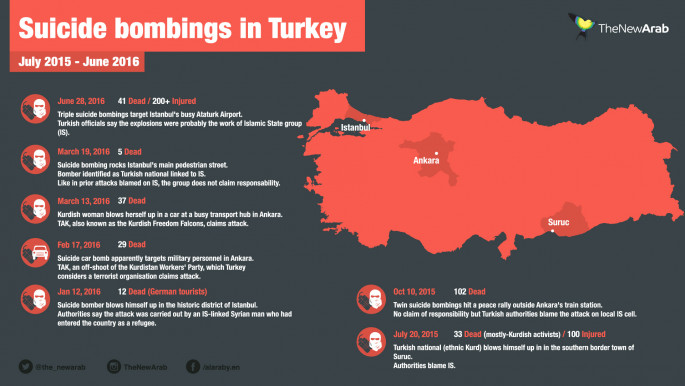Turkey, a country cursed with violence
Scenes of terror and panic plagued Turkey on Tuesday evening after a triple suicide bombing and gun attack at Istanbul's main international airport killed at least 41 people, including foreigners, and wounded over 200 others.
Attackers opened fire and then blew themselves up at the entrance to the international arrivals terminal at Ataturk airport, one of Europe's busiest hubs.
Turkey declared a day of national mourning on Wednesday over the deadly attack blamed on Islamic State extremists by the government.
Tuesday’s assault, at the start of Turkey's crucial summer tourist season, was one of the deadliest attacks to rock the country, but not by any means, the first.
Since the start of the year, Turkey has been hit by a sequence of attacks that have rattled citizens and also caused tourism to plummet.
Istanbul, the country's biggest city – and a major tourist hub home to some 15 million people – has been the target of at least four assaults this year.
Earlier this month, at least seven police officers and four civilians were killed when a bomb ripped through a police vehicle near the historic centre of Istanbul. No group had claimed responsibility, but President Recep Tayyip Erdogan pointed to the involvement of Kurdish militants.
 |
Despite paying a heavy price, Turkey has the power, determination and capacity to continue the fight against terrorism until the end - Turkish President Recep Tayyip Erdogan |
 |
On March 19, three Israelis and an Iranian were killed, while dozens more were injured in a suicide bombing blamed on Islamic State extremists targeting an Istanbul shopping thoroughfare, the Istiklal Caddesi.
The start of the year was also a deadly one, when 11 German tourists were killed and another 16 people wounded in a suicide attack by a Syrian bomber in Istanbul's Sultanahmet district, the ancient tourist heart of the city and home of the Blue Mosque. The Syrian man was linked to the Islamic State group and had entered the country as a refugee.
Turkey has been hit by at least five attacks blamed on Islamic State militants, including blasts in Ankara in October 2015 that left over 100 dead after twin suicide bombings targeted a pro-Kurdish peace rally in Ankara. The bloody attack also left more than 500 people wounded.
Ankara, like Istanbul, has been the target of many attacks. In March this year, 34 were killed in a suicide car bomb in the capital city claimed by the Kurdistan Freedom Falcons (TAK), a radical offshoot of the better-known Kurdistan Workers' Party (PKK). The attack came as Turkey prepared to launch large-scale military operations against Kurdish militants in two towns. Turkey's interior ministry identified the bomber as Seher Cagla Demir who they say was "affiliated with the outlawed Kurdistan Workers' Party (PKK) since 2013" and had then "crossed into Syria and received terror training in the YPG terrorist organisation".
TAK also claimed responsibility for a car bomb in February targeting the Turkish military in Ankara. The attack left at least 29 people dead. It was one of the deadliest assaults targeting the military in recent years.
 |
The attacks in Turkey's heartland have had a dire effect on the tourism industry and further violence comes at the worst possible time heading into the key summer season |  |
Violence between the PKK and the Turkish government has soared up after the breakdown of a mutual ceasefire between the two foes last year.
|
|
|
TAK said its attacks were to avenge a sustained offensive against the outlawed PKK in southeastern Turkey following the collapse of the ceasefire. Hundreds of members of the Turkish security forces have since been killed in PKK attacks.
The attacks in Turkey's heartland have had a dire effect on the tourism industry and further violence comes at the worst possible time heading into the key summer season.
Some 1.75 million foreigners came to Turkey in April, down more than 28 percent on April 2015, the tourism ministry said in its latest release.
The fall was the steepest monthly decrease for 17 years and raised fresh concerns about the health of the industry heading into the crucial summer season.
The US embassy in Turkey in April warned of "credible threats" to tourist areas in Istanbul and the resort city of Antalya, in particular to public squares and docks.
Many people have expressed anger and sadness with the current state of security in the country. Following the attack at Ataturk airport, the hashtags #TurkeyWillNotSurrender and #PrayForTurkey started to trend.
Turkish President Erdogan followed the same sentiment in his statement after the deadly attack: "We urge the world, especially Western countries, to take a firm stand against terrorism," he said.
"Despite paying a heavy price, Turkey has the power, determination and capacity to continue the fight against terrorism until the end."
 |
|





 Follow the Middle East's top stories in English at The New Arab on Google News
Follow the Middle East's top stories in English at The New Arab on Google News


